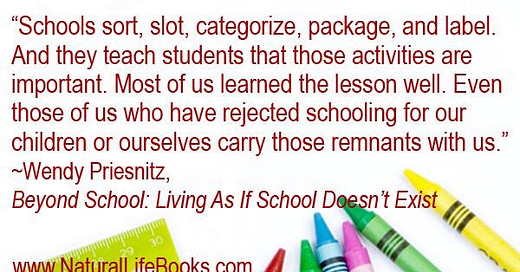“Kids are getting ruder, teachers say. And new research backs that up” blares a headline. Apparently, “students feel empowered to just speak out whenever they have a question on their mind.” Oh, the horror. When will we stop blaming kids and start looking at the root cause of why they're not happy at school?
First of all, it's not news that adults are getting ruder too. So why wouldn't younger people pick up on that? Studying at home during the pandemic is also reportedly to blame, according to the academic study referenced in the media headline, although as someone who advocates for school-free learning, I can't agree with that.
But, for me, it goes much deeper than the hand wringing about the need to teach kids manners and “classroom civility” as the researchers put it. I see a child closing their books and packing up to leave before the teacher has finished the lesson as a signal that they're simply not interested and/or have different priorities. But, then, I respect kids’ opinions; not everyone does. If someone prepared to leave my dinner party early, I'd either think they weren't feeling well, had somewhere else more important to go, or were just not enjoying themselves. I'd either wish them well as I helped them out the door or allow them to sneak out quietly. But, in our adult and educational arrogance, we assume a child or young person must participate in the experience that we're providing in school – because we've decided that it's good for them, not because it necessarily is – and look happy about the situation at the same time.
Unfortunately for those adults who want to force students' attention, a basic tenet of learning is that it's not something that's done to us. We learn best when we're genuinely interested in a topic, not because we're forced to pay attention. In fact, children instinctively know that until we school it out of them.
But here we go yet again blaming the students for a wrongly designed system. As I wrote last summer, “there’s nothing unusual about people of any age rebelling and even acting violently as a reaction to being continually controlled and coerced, and then punished for their rebellious behaviour.”
Is this apparent “classroom incivility” not a wake-up call that an outdated system must change? Or would we rather continue to try and convince children and young people that they are not only impolite but also incompetent and incapable of making their own decisions about life and learning? That they shouldn't talk back to injustice? Do we, instead, want to continue to train them to be obedient cogs in the wheel?
Growth and change often require us to step outside our comfort zones. Asking ourselves the difficult but honest questions that drill down into our ideas and beliefs about children and education can be challenging.
The answers may change as we think about them, and as we grow in our awareness of our own adultism and what it means to trust children rather than repress and reform them and teach them to be obedient. I think we owe it to our children, ourselves, and our future as a species to consider these questions. We might discover a whole generation of people who have a wonderfully creative energy to learn and to fix some of the things in our society that we've broken.



